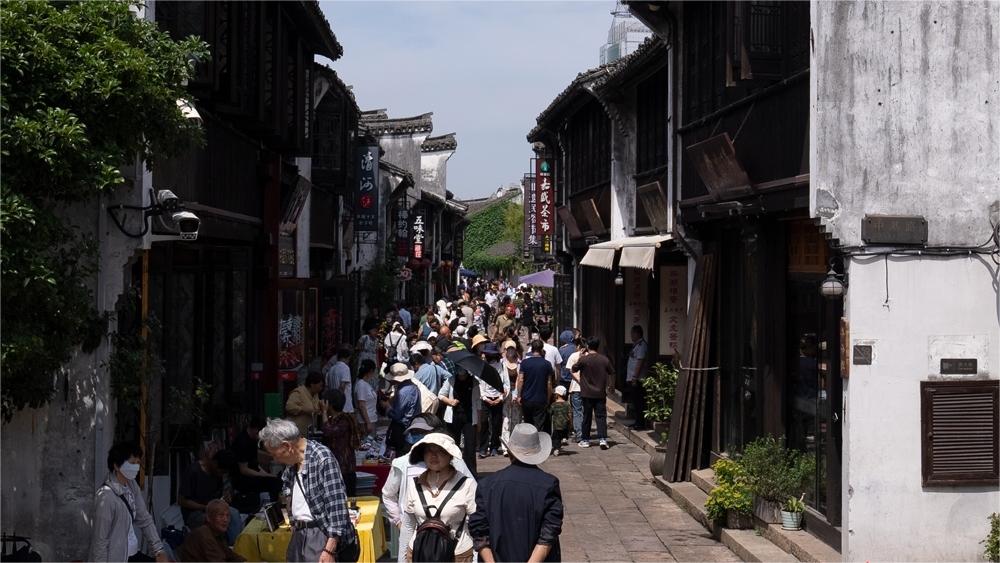Realty eyes stability and recovery
The recent wave of supportive policies for the beleaguered property industry will guide the real estate market toward stability and recovery, experts said.
The measures announced on May 17 both at the national and local levels vary from city to city to suit specific local conditions. Their intensity and scale are expected to help form a new real estate development model and facilitate the high-quality development of the property industry in China, they said.
Recent measures include lowering of down payment ratios, cuts to mortgage interest rates and efforts to digest home inventories, and came amid mounting market expectations for further measures to boost homebuyer confidence and ease liquidity pressures on property developers.
"We believe the worst is behind the property market," said Chen Sheng, president of the China Real Estate Data Academy.
"The recent real estate policies aim to stimulate market vitality and supplement liquidity needed to balance supply and demand," said Shaun Brodie, head of research on the China market at Cushman &Wakefield, a global real estate services firm.
Brodie said the People's Bank of China, the country's central bank, has issued three consecutive documents aimed at reducing the cost of buying a home and the threshold for homeownership, boosting confidence on the demand side.
"The policies also grant more flexibility to local governments and consolidate their primary responsibilities, requiring them to strike a balance between stabilizing the real estate market and avoiding financial risk."
Pang Ming, chief economist for JLL China, said he believes the combined policy measures will have a positive effect.
"Abolishing the floor limit of commercial individual mortgage rates for first- and second-time homebuyers nationwide, cutting the loan rates of the individual housing provident fund, and lowering the minimum down payment ratios for individuals' commercial housing mortgages will help reduce down payment burden and costs for residents, and hence increase their ability and willingness to purchase houses," Pang said.
Pang also said the latest initiative will help foster a more favorable monetary and credit environment for the stabilization and recovery of the housing market from the demand side. In addition, it will boost residents' consumption capacity, effectively safeguarding and improving people's livelihoods, actively stimulating domestic demand, and harnessing consumption's fundamental role in driving economic growth.
While boosting demand by lowering costs, the country announced the establishment of a 300 billion yuan ($41.4 billion) re-lending facility for affordable housing, to encourage and guide financial institutions to support local State-owned enterprises in acquiring unsold completed commercial housing at appropriate prices.
"The decision is expected to more directly alleviate the liquidity risk of real estate enterprises and consolidate financial stability. Meantime, the government demand as an effective supplement to market demand will contribute to the long-term supply-side structural reform of the real estate market," said Chen Zhixu, senior manager with CBRE China research.
Chen said these measures will capture the spirit of the Political Bureau of the Communist Party of China Central Committee meeting on April 30, which urged the implementation of policies from city to city, ensuring the delivery of property projects, and called for measures to digest property inventories and optimize new demand in a coordinated manner.
"Given its rich content and great intensity, this batch of policies has reflected the Chinese government's resolve to stabilize the real estate market and capabilities in policy planning and innovation. The policies are expected to have an extremely positive impact on the ongoing efforts for property market stabilization and timely home delivery. The sector's decline can be narrowed," Chen said.
Once the new policies are fine-tuned during the follow-up process, market activity and confidence will recover in first-tier cities, and gradually pass on to second-tier and other cities, said Chen Sheng, president of the China Real Estate Data Academy.
Zhang Ange, a white-collar worker at a private firm in Shanghai, said he just bought a 90-square-meter apartment in Jing'an district. "After living and working in the city for eight years, we (my wife and I) finally have a place that can be called home," said the 32-year-old Wuhan native, who became eligible to buy a home in Shanghai as a first-time homebuyer after the city eased homebuying requirements last September.
"I know the market adjustment may continue, but from a living perspective, market ups and downs have little effect on the market for self-use homes," said Zhang.
Some Chinese cities responded to the national policies with an array of measures to shore up local property markets, which triggered speculation that more cities will likely follow suit.
Both South China's Guangzhou and Shenzhen announced on May 28 they would loosen restrictions on home buying.
Shanghai removed more restrictions on homebuying on May 27 by allowing eligible single buyers to buy used homes downtown. Families with more than one child can now buy an extra residential property.
A nine-item local notice that took effect in Shanghai on May 28 included adjustments to home purchase restrictions, support for reasonable home living requirements for families with more than one child, optimization of credit policies, encouragement for trade-in deals and improvements to land and housing supply.
Cities including Wuhan of Hubei province and Huzhou of Zhejiang province have reportedly lowered down payment ratios for first-home buyers to as low as 15 percent, said Yan Yuejin, director of the Shanghai-based E-house China Research and Development Institution.
Beijing, Shanghai, Shenzhen in Guangdong province and Hefei in Anhui province also announced other supportive measures, like cutting interest rates on mortgages and housing provident funds.
Some commercial banks in Central China's Wuhan went further by lowering the first-home loan interest rate to as low as 3.25 percent, said Yan.
The list gets longer by the day. Experts said many more cities are expected to cut various minimum requirements to buy homes.
In fact, some 50 cities had already eased their respective restrictions on homebuying ahead of the May 17 announcements. And 23 cities, including Xi'an of Shaanxi Province, Hangzhou of Zhejiang Province, and Chengdu of Sichuan Province, had scrapped all limits with regard to home transactions, according to statistics from the Zhuge Real Estate Data Research Center.
Brodie said due to the continued impact of market factors like house price expectations, the stabilization of the residential real estate market will likely still take some more time to reach a positive growth recovery point.
"These new policies focus on reducing the cost of purchasing property and the threshold for homeownership, which may boost confidence on the demand side. The government may need to take measures to flexibly adjust land supply and precisely control the pace of new housing development to prevent any further imbalance between supply and demand."
The property data released on May 17 indicated that adjustments in the industry are continuing, said Liu Aihua, spokeswoman of the National Bureau of Statistics.
"Both market resumption and confidence recovery require time, and uncertainties remain in the forthcoming market stabilization process," said Chen of CBRE.
On creating a new real estate development model and promoting high-quality real estate development, she suggested structural adjustments on the supply side and more diversified measures to boost demand.
Pang said it is also essential to note that merely using monetary policies such as lowering down payment ratios and mortgage rates cannot completely, effectively and fundamentally solve the cyclical, structural and trend-related challenges facing the real estate market.
"At present, the real estate market is still in the process of determining the lowest point, continuing to make necessary adjustments. Accordingly, real estate regulation should steer clear of too simplistic and linear policy approaches aiming to stimulate an overly frigid market or restrict overheating," Pang said.
He suggested regulators should develop a deeper understanding of the changes in supply and demand, recognize the role of city-specific policies and adjust measures to local conditions, and consider both incremental and stock issues comprehensively.
Chinese cities reported deeper home price drops in April both in year-on-year and month-on-month terms, which indicated the property market remains in a process of adjustment, said Wang Zhonghua, an NBS statistician.
Price declines accelerated month-on-month in all the third-tier cities in both markets (for new homes and pre-owned properties), said Wang.
He attributed the big price drops to the evident increase in the number of homes available for transacting in the pre-owned home market and a weak market expectation. "The property industry should continue to adapt to the changes taking place as efforts are made jointly to build a new property development model," said Pang.
Photos
Related Stories
- Housing buzz about easing in more cities grows
- China In Perspective: From trade-ins to affordable housing plans, China's innovative approaches to destock housing inventory
- Raft of policies injects vitality into China's property market, raising expectations
- Shanghai makes it easier for people to buy property there
- Guangzhou, Shenzhen become latest Chinese cities to ease home-buying restrictions
- Loans issued from China's housing provident fund nears 1.5 trln yuan in 2023
Copyright © 2024 People's Daily Online. All Rights Reserved.









